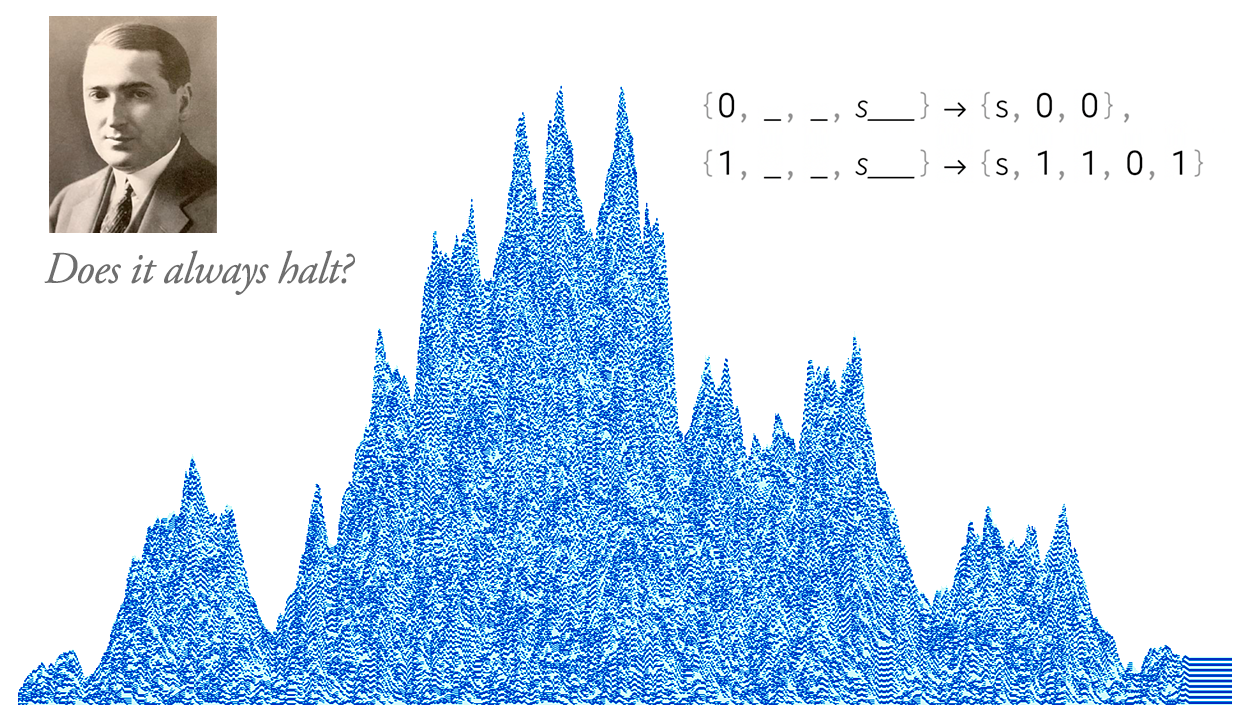Institute Output

How Did We Get Here? The Tangled History of the Second Law of Thermodynamics
Stephen Wolfram
As I’ve explained elsewhere, I think I now finally understand the Second Law of thermodynamics. But it’s a new understanding, and to get to it I’ve had to overcome a certain amount of conventional wisdom about the Second Law that I at least have long taken for granted. And to check myself I’ve been keen to know just where this conventional wisdom came from, how it’s been validated, and what might have made it go astray.

Alien Intelligence and the Concept of Technology
Stephen Wolfram
“We’re going to launch lots of tiny spacecraft into interstellar space, have them discover alien intelligence, then bring back its technology to advance human technology by a million years”.
But as I thought about it, I realized that beyond the “absurdly extreme moonshot” character of this pitch, there’s some science that I’ve done that makes it clear that it’s also fundamentally philosophically confused. The nature of the confusion is interesting, however, and untangling it will give us an opportunity to illuminate some deep features of both intelligence and technology—and in the end suggest a way to think about the long-term trajectory of the very concept of technology and its relation to our universe.

Games and Puzzles as Multicomputational Systems
Stephen Wolfram
Multicomputation is one of the core ideas of the Wolfram Physics Project—and in particular is at the heart of our emerging understanding of quantum mechanics. But how can one get an intuition for what is initially the rather abstract idea of multicomputation? A good approach, I believe, is to see it in action in familiar systems and situations. And I explore here what seems like a particularly good example: games and puzzles.

We’ve Got a Science Opportunity Overload: It’s Time to Launch the Wolfram Institute!
Stephen Wolfram
We’re in the midst of a major “science opportunity overload”. And to be good stewards of the ideas and their potential we’ve got to scale things up. I’ve had lots of experience over decades in making big projects happen. And now it’s time to take that experience and define a new structure to move forward the amazing science opportunity we find ourselves with. And I think that leaves us no choice: we’ve got to launch the Wolfram Institute, and now!

On the Concept of Motion
Stephen Wolfram
It seems like the kind of question that might have been hotly debated by ancient philosophers, but would have been settled long ago: how is it that things can move? And indeed with the view of physical space that’s been almost universally adopted for the past two thousand years it’s basically a non-question. As crystallized by the likes of Euclid it’s been assumed that space is ultimately just a kind of “geometrical background” into which any physical thing can be put—and then moved around.

The Physicalization of Metamathematics and Its Implications for the Foundations of Mathematics
Stephen Wolfram
One of the many surprising (and to me, unexpected) implications of our Physics Project is its suggestion of a very deep correspondence between the foundations of physics and mathematics. We might have imagined that physics would have certain laws, and mathematics would have certain theories, and that while they might be historically related, there wouldn’t be any fundamental formal correspondence between them.
But what our Physics Project suggests is that underneath everything we physically experience there is a single very general abstract structure—that we call the ruliad—and that our physical laws arise in an inexorable way from the particular samples we take of this structure.

The Concept of the Ruliad
Stephen Wolfram
I call it the ruliad. Think of it as the entangled limit of everything that is computationally possible: the result of following all possible computational rules in all possible ways. It’s yet another surprising construct that’s arisen from our Physics Project. And it’s one that I think has extremely deep implications—both in science and beyond.

Multicomputation with Numbers: The Case of Simple Multiway Systems
Stephen Wolfram
Multicomputation is an important new paradigm, but one that can be quite difficult to understand. Here my goal is to discuss a minimal example: multiway systems based on numbers. Many general multicomputational phenomena will show up here in simple forms (though others will not). And the involvement of numbers will often allow us to make immediate use of traditional mathematical methods.

Multicomputation: A Fourth Paradigm for Theoretical Science
Stephen Wolfram
One might have thought it was already exciting enough for our Physics Project to be showing a path to a fundamental theory of physics and a fundamental description of how our physical universe works. But what I’ve increasingly been realizing is that actually it’s showing us something even bigger and deeper: a whole fundamentally new paradigm for making models and in general for doing theoretical science. And I fully expect that this new paradigm will give us ways to address a remarkable range of longstanding central problems in all sorts of areas of science—as well as suggesting whole new areas and new directions to pursue.

How Inevitable Is the Concept of Numbers?
Stephen Wolfram
The aliens arrive in a starship. Surely, one might think, to have all that technology they must have the idea of numbers. Or maybe one finds an uncontacted tribe deep in the jungle. Surely they too must have the idea of numbers. To us numbers seem so natural—and “obvious”—that it’s hard to imagine everyone wouldn’t have them. But if one digs a little deeper, it’s not so clear.

The Problem of Distributed Consensus
Stephen Wolfram
In any decentralized system with computers, people, databases, measuring devices or anything else one can end up with different values or results at different “nodes”. But for all sorts of reasons one often wants to agree on a single “consensus” value, that one can for example use to “make a decision and go on to the next step”.

Why Does the Universe Exist? Some Perspectives from Our Physics Project
Stephen Wolfram
Why does the universe exist? Why is there something rather than nothing? These are old and fundamental questions that one might think would be firmly outside the realm of science. But to my surprise I’ve recently realized that our Physics Project may shed light on them, and perhaps even show us the way to answers.

The Wolfram Physics Project: A One-Year Update
Stephen Wolfram
When we launched the Wolfram Physics Project a year ago today, I was fairly certain that—to my great surprise—we’d finally found a path to a truly fundamental theory of physics, and it was beautiful. A year later it’s looking even better. We’ve been steadily understanding more and more about the structure and implications of our models—and they continue to fit beautifully with what we already know about physics, particularly connecting with some of the most elegant existing approaches, strengthening and extending them, and involving the communities that have developed them.

A Little Closer to Finding What Became of Moses Schönfinkel, Inventor of Combinators
Stephen Wolfram
For most big ideas in recorded intellectual history one can answer the question: “What became of the person who originated it?” But late last year I tried to answer that for Moses Schönfinkel, who sowed a seed for what’s probably the single biggest idea of the past century: abstract computation and its universality.

What Is Consciousness? Some New Perspectives from Our Physics Project
Stephen Wolfram
Consciousness is a topic that’s been discussed and debated for centuries. But the surprise to me is that with what we’ve learned from exploring the computational universe and especially from our recent Physics Project it seems there may be new perspectives to be had, which most significantly seem to have the potential to connect questions about consciousness to concrete, formal scientific ideas.

After 100 Years, Can We Finally Crack Post’s Problem of Tag? A Story of Computational Irreducibility, and More
Stephen Wolfram
For Post, the failure to crack his system derailed his whole intellectual worldview. For me now, the failure to crack Post’s system in a sense just bolsters my worldview—providing yet more indication of the strength and ubiquity of computational irreducibility and the Principle of Computational Equivalence.

Multiway Turing Machines
Stephen Wolfram
Over the years I’ve studied the simplest ordinary Turing machines quite a bit, but I’ve barely looked at multiway Turing machines (also known as nondeterministic Turing machines or NDTMs). Recently, though, I realized that multiway Turing machines can be thought of as “maximally minimal” models both of concurrent computing and of the way we think about quantum mechanics in our Physics Project. So now this piece is my attempt to “do the obvious explorations” of multiway Turing machines.

Where Did Combinators Come From? Hunting the Story of Moses Schönfinkel
Stephen Wolfram
Looking back a century it’s remarkable enough that Moses Schönfinkel conceptualized a formal system that could effectively capture the abstract notion of computation. And it’s more remarkable still that he formulated what amounts to the idea of universal computation, and showed that his system achieved it.

Combinators and the Story of Computation
Stephen Wolfram
Moses Schönfinkel imagined that with combinators he was finding “building blocks for logic”. And perhaps the very simplicity of what he came up with makes it almost inevitable that it wasn’t just about logic: it was something much more general. Something that can represent computations. Something that has the germ of how we can represent the “machine code” of the physical universe.

Combinators: A Centennial View
Stephen Wolfram
Before Turing machines, before lambda calculus—even before Gödel’s theorem—there were combinators. They were the very first abstract examples ever to be constructed of what we now know as universal computation—and they were first presented on December 7, 1920. In an alternative version of history our whole computing infrastructure might have been built on them. But as it is, for a century, they have remained for the most part a kind of curiosity—and a pinnacle of abstraction, and obscurity.
